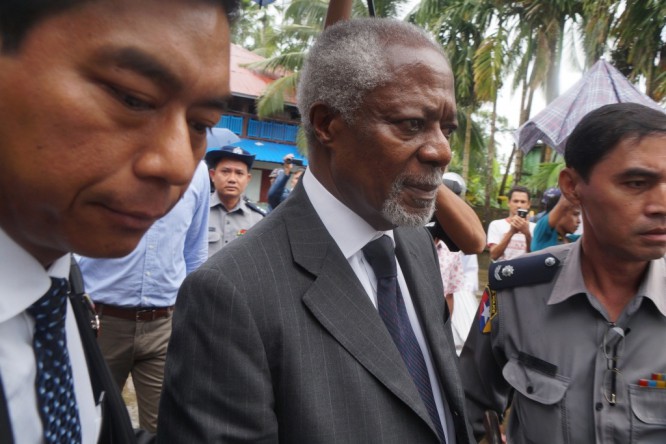A team led by former UN chief Kofi Annan began to address the plight of Burma’s persecuted Rohingya Muslims on Wednesday, meeting people displaced in communal violence that has raised concern about the country’s commitment to human rights.
Burmese leader Aung San Suu Kyi appointed the nine-member commission to advise her on the situation in Arakan State, also known as Rakhine, where ethnic Arakanese Buddhists and Rohingya Muslims have lived separately since clashes in 2012 in which more than 100 people were killed.
Some 125,000 people are living in camps, the vast majority members of the Rohingya minority who are denied citizenship in Burma, officially known as Myanmar, where many members of the majority Buddhist community see them as illegal immigrants from Bangladesh.
The six Burmese and three foreign commissioners, including Kofi Annan, toured the camps for displaced people in the northwestern state and met members of both communities.
Annan and his fellow team members did not speak to reporters but they raised hopes for peace among some of those they met.
“I believe that this commission will help solve the problems between the Rakhine and the Rohingya,” said Hla Myint, a representative of the Dar Paing internally displaced camp.
The end of decades of strict military rule in Burma has exposed communal tension between minority Muslims and some Buddhists, and fuelled a Buddhist nationalist movement led by hardline monks.
The commission arrived in the region on Tuesday to a hostile reception from hundreds of residents and monks.
The state’s largest political party, which helped organise the protest, opposes the commission saying the foreigners can’t understand the region’s history.
[related]
Suu Kyi has been cautious in her approach to the Arakan State violence but has gradually become more outspoken since she led her party to victory in a landmark election last November.
This week, she described the conflict as a “wound on the body politic of the nation” that could not be ignored.
Muslim religious leader Kyaw Zan La told the commission during a meeting in the Thet Ke Pyin camp, home to more than 5,000 people, that his community wanted peace.
“The two communities have been living together for hundreds of years,” Kyaw Zan La said.
“We Rohingyas want to live side by side with the Rakhine people.”
The panel also visited the Aung Mingalar quarter of the state capital, Sittwe, where several thousand Rohingya live cordoned off by police checkpoints.
“If there’s a medical emergency, we can’t go directly to the hospital even though it’s nearby. We have to get permission,” said teacher Maung Kyaw Naing, 25.
Suu Kyi is set to visit the United States this month, where she is seeking further sanctions relief for her country, and is likely to face questions on her handling of the Arakan issue.



